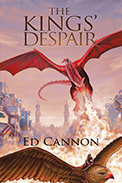
 |
This novel is the third in a trilogy by the author. Similar to other works that might be defined as psychological, albeit fictional, the book's characters are well-developed, as are their relationships and motivations. These include Queen Margatha of Ilicia and her brother, plus a multitude of old, new, and often ambiguous characters. Some are allies, some former allies, and there are others who seek revenge for murders and other crimes committed in and on the periphery of war. Two distinct characters are Sillik, from a rival city, whose father has been murdered. Consequently, he wants to prepare for a violent conflict against Ilicia. Then there is Juliane, who is grieving the death of her husband. In the midst of grief, change, and conflict are the emotional reactions and political maneuverings of others who seek alliances.
Cannon creates tools that help draw the reader into the multiple situations of geography and time frames, such as genealogies, the years of rulers' reigns, and beautiful illustrations of the lands in the story. Cannon is in line with T.H. White and Tolkien as one who has created a multi-leveled, challenging, thought-provoking world of interesting characters motivated by relatable events and responses, even when they are supernatural. The author grasps the elusive qualities of characters to have multiple motivations that transcend the concepts of "good" and "bad" and just "are" by showing that they are hurt, flawed, seeking, etc., making them relatable and understandable. The characters must function within political systems that may defeat them and have defeated some of the ones whom they loved. Their individual situations and group interactions make this story first-rate and highly readable.
RECOMMENDED by the US Review